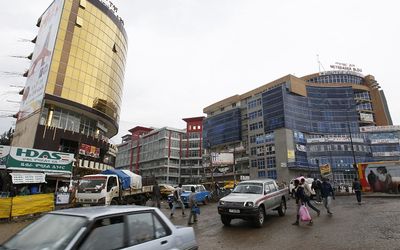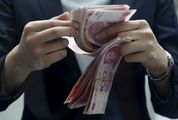YOU just cannot run a modern economy in an undemocratic country. The Chinese are discovering this right now as their currency, the yuan, falls precipitously. No matter how the Chinese respond, money continues to leave the country in a flood. Analysts reckon more than $1-trillion (a thousand billion dollars) has left China in the past year.
The yuan has dropped more than 5% against the dollar. Obviously, the start of interest rate increases in the US has played a big part in this, but the flood of money out of China is also a rush for safety. Beijing cannot explain what its broad strategy is anymore — a year ago, it was to "normalise" the economy by cranking up consumer spending and to ease up on the importation of commodities for heavy industry.
That meant it would have to liberalise its markets. But liberalisation means more Chinese are doing what they want with their money rather than what the Communist Party wants them to do. Today, no one really knows what is going on. That’s a problem.
And, where the free flow of debate and information might take the lid off the pressure cooker, it doesn’t exist.
A week ago, the international financier George Soros warned in Davos that the Chinese economy was in for a "hard landing", an economic shock rather than what the party wants the markets to believe is a finely managed descent. The response in China was swift as state-controlled media turned their guns on Soros and others selling the Chinese currency short and driving down its value.
"What (the Chinese media) are saying won’t put off speculators," Bloomberg quoted a Hong Kong banker saying. "The fundamentals are screaming and sending a clear picture that if economic growth doesn’t start picking up, the exchange rate will weaken."
When you’re as opaque as the Chinese, it’s always going to be a crisis that either forces greater democratic gains or the opposite.
Anyway, I approached this topic because I saw in this newspaper on Wednesday an appalling article on the leader page. Written by Nimrod Zalk, once a senior industrial policy figure in the Department of Trade and Industry, it was about how Ethiopia was proving all the Africa doomsayers wrong by rapidly growing its economy and its industrial base.
"Ethiopia quietly dispels Africa myths", ran the headline.
There have been many similar before it. Ethiopia is Africa’s growth poster child, a heavy political hand notwithstanding.
Sadly, that may all be absolute nonsense and the point I started with may be to blame.
Ethiopia strictly controls its media and foreign journalists. There is no authentic way, other than living there for an extended period, to know whether the Ethiopia Rising story is itself a myth or not.
I recently came across a paper on the London School of Economics (LSE) website that argues persuasively that official Ethiopian statistics are as reliable as Enron’s accounting was.
But buttressed by expensive foreign public relations firms and strict control over who is allowed in to report on the Ethiopian miracle, the government has been able to sustain its narrative.
Sort of. In his LSE paper, J Bonsa argues while gross domestic product statistics and those on other sectors are easily manipulated, it is harder in agriculture.
And why, he asks, is it that despite reporting strong growth in agricultural output in recent years, famine once again stalks the land and the West is having to supply emergency food aid to 10-million Ethiopians? He thinks he may have found the answer.
Ethiopia’s Central Statistics Authority produces annual surveys of crop production. Unable to understand why the rosy figures produced by the authority were not enough to stave off the starvation of 10-million citizens, the EU Commission’s in-house Joint Research Centre commissioned the International Food Policy Research Institute to try to reconcile official reports of huge production with apparent famine.
To cut a long story short, the institute’s estimates of what the actual crop outcomes had been were spectacularly lower than the official figure, giving the lie, he says, to the Ethiopian myth.
Taking 2007-08 data, it estimated production of teff, a fine grain, at 32% lower than the official statistics, wheat at 31% lower, maize 29% lower and sorghum 44% lower, for an average estimate from crop production 34% lower than the Ethiopians’ statistics.
Between 2000 and 2007, Ethiopia reported a 66% increase in crop yields, while its neighbours struggled. Kenya managed an increase of only 23%, while Uganda didn’t increase at all.
"This reveals the extents (sic) of data manipulation by Ethiopian authorities to create an inexistent (sic) economic success story and (which) seeks political legitimacy using a bogus record," says the author. "It is likely that worse distortions would be revealed if similar studies were done on Ethiopia’s growth statistics in other sectors, including manufacturing and service division."
Worse is this observation: "The World Bank, IMF (International Monetary Fund) and other donors have often anchored their conclusions on poverty reduction on alleged changes in the agricultural sector, where the bulk of the poor live and work….
"This raises the question: where (have) the billions of dollars in bilateral and multilateral aid pumped into Ethiopia in the name of poverty reduction and the millennium development goals gone?" Bonsa wrote.
Okay, let’s assume Bonsa may not be the Ethiopian regime’s closest friend. But he is being interesting, and that’s important.
Once again, I don’t know much about the Ethiopian economy, but I have listened to Helen Haiyu explain how and why she started a giant shoe manufacturing operation in the country. She made it clear in a recent talk to the South African Institute for International Affairs. She said the labour she was paying $500 a month for in China, was available in Ethiopia for $50.
How very simple then. Just follow the Chinese example — force your people into the cities, force them to belong to a sweetheart union and to accept low wages, and then invite foreign manufacturers to set up manufacturing plants and take advantage of your own citizens — and you too can become an economic powerhouse.
How come the ANC never got the message? It’s China, for goodness’ sake! How could they possibly be wrong? If only the media would shut up.

People walk through the streets of a shopping area in Addis Ababa, Ethiopia. Picture: REUTERS
YOU just cannot run a modern economy in an undemocratic country. The Chinese are discovering this right now as their currency, the yuan, falls precipitously. No matter how the Chinese respond, money continues to leave the country in a flood. Analysts reckon more than $1-trillion (a thousand billion dollars) has left China in the past year.
The yuan has dropped more than 5% against the dollar. Obviously, the start of interest rate increases in the US has played a big part in this, but the flood of money out of China is also a rush for safety. Beijing cannot explain what its broad strategy is anymore — a year ago, it was to "normalise" the economy by cranking up consumer spending and to ease up on the importation of commodities for heavy industry.
That meant it would have to liberalise its markets. But liberalisation means more Chinese are doing what they want with their money rather than what the Communist Party wants them to do. Today, no one really knows what is going on. That’s a problem.
And, where the free flow of debate and information might take the lid off the pressure cooker, it doesn’t exist.
A week ago, the international financier George Soros warned in Davos that the Chinese economy was in for a "hard landing", an economic shock rather than what the party wants the markets to believe is a finely managed descent. The response in China was swift as state-controlled media turned their guns on Soros and others selling the Chinese currency short and driving down its value.
"What (the Chinese media) are saying won’t put off speculators," Bloomberg quoted a Hong Kong banker saying. "The fundamentals are screaming and sending a clear picture that if economic growth doesn’t start picking up, the exchange rate will weaken."
When you’re as opaque as the Chinese, it’s always going to be a crisis that either forces greater democratic gains or the opposite.
Anyway, I approached this topic because I saw in this newspaper on Wednesday an appalling article on the leader page. Written by Nimrod Zalk, once a senior industrial policy figure in the Department of Trade and Industry, it was about how Ethiopia was proving all the Africa doomsayers wrong by rapidly growing its economy and its industrial base.
"Ethiopia quietly dispels Africa myths", ran the headline.
There have been many similar before it. Ethiopia is Africa’s growth poster child, a heavy political hand notwithstanding.
Sadly, that may all be absolute nonsense and the point I started with may be to blame.
Ethiopia strictly controls its media and foreign journalists. There is no authentic way, other than living there for an extended period, to know whether the Ethiopia Rising story is itself a myth or not.
I recently came across a paper on the London School of Economics (LSE) website that argues persuasively that official Ethiopian statistics are as reliable as Enron’s accounting was.
But buttressed by expensive foreign public relations firms and strict control over who is allowed in to report on the Ethiopian miracle, the government has been able to sustain its narrative.
Sort of. In his LSE paper, J Bonsa argues while gross domestic product statistics and those on other sectors are easily manipulated, it is harder in agriculture.
And why, he asks, is it that despite reporting strong growth in agricultural output in recent years, famine once again stalks the land and the West is having to supply emergency food aid to 10-million Ethiopians? He thinks he may have found the answer.
Ethiopia’s Central Statistics Authority produces annual surveys of crop production. Unable to understand why the rosy figures produced by the authority were not enough to stave off the starvation of 10-million citizens, the EU Commission’s in-house Joint Research Centre commissioned the International Food Policy Research Institute to try to reconcile official reports of huge production with apparent famine.
To cut a long story short, the institute’s estimates of what the actual crop outcomes had been were spectacularly lower than the official figure, giving the lie, he says, to the Ethiopian myth.
Taking 2007-08 data, it estimated production of teff, a fine grain, at 32% lower than the official statistics, wheat at 31% lower, maize 29% lower and sorghum 44% lower, for an average estimate from crop production 34% lower than the Ethiopians’ statistics.
Between 2000 and 2007, Ethiopia reported a 66% increase in crop yields, while its neighbours struggled. Kenya managed an increase of only 23%, while Uganda didn’t increase at all.
"This reveals the extents (sic) of data manipulation by Ethiopian authorities to create an inexistent (sic) economic success story and (which) seeks political legitimacy using a bogus record," says the author. "It is likely that worse distortions would be revealed if similar studies were done on Ethiopia’s growth statistics in other sectors, including manufacturing and service division."
Worse is this observation: "The World Bank, IMF (International Monetary Fund) and other donors have often anchored their conclusions on poverty reduction on alleged changes in the agricultural sector, where the bulk of the poor live and work….
"This raises the question: where (have) the billions of dollars in bilateral and multilateral aid pumped into Ethiopia in the name of poverty reduction and the millennium development goals gone?" Bonsa wrote.
Okay, let’s assume Bonsa may not be the Ethiopian regime’s closest friend. But he is being interesting, and that’s important.
Once again, I don’t know much about the Ethiopian economy, but I have listened to Helen Haiyu explain how and why she started a giant shoe manufacturing operation in the country. She made it clear in a recent talk to the South African Institute for International Affairs. She said the labour she was paying $500 a month for in China, was available in Ethiopia for $50.
How very simple then. Just follow the Chinese example — force your people into the cities, force them to belong to a sweetheart union and to accept low wages, and then invite foreign manufacturers to set up manufacturing plants and take advantage of your own citizens — and you too can become an economic powerhouse.
How come the ANC never got the message? It’s China, for goodness’ sake! How could they possibly be wrong? If only the media would shut up.





















Change: 1.30%
Change: 1.45%
Change: 0.91%
Change: 1.21%
Change: 2.00%
Data supplied by Profile Data
Change: -0.09%
Change: 0.20%
Change: 1.30%
Change: 0.00%
Change: 0.41%
Data supplied by Profile Data
Change: 0.05%
Change: 0.04%
Change: -0.05%
Change: -0.66%
Change: 0.46%
Data supplied by Profile Data
Change: -0.01%
Change: 0.11%
Change: -0.13%
Change: -0.78%
Change: -0.08%
Data supplied by Profile Data